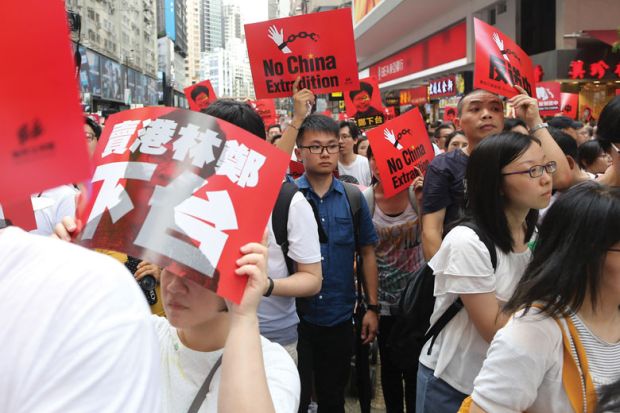Staff and students are concerned that plans to force the Chinese University of Hong Kong’s (CUHK) student union to pledge to adhere to the law will mean a “shackled” role for it in campus life, amid deepening concern over Chinese government influence over Hong Kong campuses.
In October, student representatives voted to disband their union after 50 years, claiming it faced mounting problems since the university had cut ties with the union earlier in 2021. This came in the wake of 2019 protests against the China-backed extradition law widely seen as a clampdown on political dissidents, in which Hong Kong students were a central force. A month later, CUHK signalled interest in reinstating the union – but only under certain conditions.
If the student union continues, it will need to pledge to follow university regulations and Hong Kong law, a move critics say will undermine its ability to advocate for students.
“They’ll have to refrain from being overly political – unless of course their politics are of the ‘right’ kind,” said one faculty member, who asked not to be named, noting that many Hong Kong-based universities have taken steps to distance themselves from their students’ unions, “thereby clearly implying that any form of political dissent from those groups won’t be tolerated”.
He said that taking the required pledge “basically means…signing away one’s freedom of speech on any matters the Chinese government deems ‘sensitive’”, something that might not “completely defeat” the purpose of having a student union, but “nevertheless means it will be shackled in its operations”.
According to another faculty member, asking student organisations to sign a pledge has become a “standard requirement and political gesture” for Hong Kong institutions wishing to avoid legal responsibility for the actions of students.
“Under the threat of national security law, the decline of civil society, and a generation of young leaders in jail or in exile, it is obvious that the survival space for student organisations is very limited,” he said.
“In the future if there is really a new student union, they will keep a much lower profile, or discussion will remain [focused on] campus policy,” said Maggie Choi, a fourth-year CUHK student and organiser in the Student Association Concern Group, an unofficial body that aims to bring together student organisations in the absence of a union.
Owen Au, a senior who served as student union president in 2018, said that during his own tenure, the union’s functions became largely “confined within campus and concerned [with] student affairs”, on less politically sensitive issues, such as individuals’ academic progress or whether cafeteria food was satisfactory.
After the 2019 protests, said Mr Au, the university administration began to consider the student union a “cradle of rebellion”.
He added: “There is little space for us to participate in social political issues [but] it’s important for us to maintain a network among students.”
Kristin Cheung, a fourth-year student organiser in the Student Association Concern Group, expressed hope that a renewed students’ union could play a larger role in tackling controversial university policies such as security checks on campus.
A spokesperson for CUHK said that the university did not pressure or coerce the students’ union to dissolve.
“Requiring members of a university to abide by the law is not unreasonable in the context of widely used international practice”, with such agreements common at leading institutions in the US and the UK, he said.
“We are always open to constructive and collaborative dialogue with students to explore options for the establishment of a more diversified and inclusive student organisation,” he added.
Register to continue
Why register?
- Registration is free and only takes a moment
- Once registered, you can read 3 articles a month
- Sign up for our newsletter
Subscribe
Or subscribe for unlimited access to:
- Unlimited access to news, views, insights & reviews
- Digital editions
- Digital access to THE’s university and college rankings analysis
Already registered or a current subscriber? Login










